
Featured news
01 Jul 2025
Cheese may really be giving you nightmares, scientists find
Scientists find lactose intolerance may link consuming dairy, bad dreams, and poor sleep.

Featured news
01 Jul 2025
Scientists find lactose intolerance may link consuming dairy, bad dreams, and poor sleep.

Featured news
01 May 2024
Scientists found that popular teenagers sleep less than their peers, and that popular girls experience more insomnia symptoms than popular boys

Featured news
07 Dec 2023
New study shows that working night shifts favors development of sleep disorders, particularly in young adults with a lower education
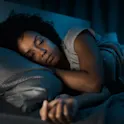
Featured news
02 Mar 2023
by Angharad Brewer Gillham, Frontiers science writer Image/Shutterstock.com Patients visiting their GP who reported sleeping less than six hours or more than nine were more likely to present with an infection. Patients who reported sleeping too little, or having insomnia or a chronic sleep disorder, were even more likely to need antibiotics. Scientists say that good sleep could lower our risk of infection and need for antibiotics. A good night’s sleep can solve all sorts of problems – but scientists have now discovered new evidence that sleeping well may make you less vulnerable to infection. Scientists at the University of Bergen recruited medical students working in doctors’ surgeries to hand out short questionnaires to patients, asking about sleep quality and recent infections. They found that patients who reported sleeping too little or too much were more likely also to report a recent infection, and patients who experienced chronic sleep problems were more likely to report needing antibiotics. “Most previous observational studies have looked at the association between sleep and infection in a sample of the general population,” said Dr Ingeborg Forthun, corresponding author of the study published in Frontiers in Psychiatry. “We wanted to assess this association among patients in […]
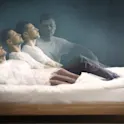
Featured news
24 Jun 2021
By Colm Gorey, Frontiers science writer Image: New Africa/Shutterstock.com New research published in the open access journal Frontiers investigating the biological mysteries of sleepwalking found the levels of ‘fight or flight’ response in those who wander at night is surprisingly lower than those who sleep soundly. Somnambulism – otherwise known as sleepwalking – is a phenomenon which has fascinated the public and neurologists for decades, but a lot of what causes it remains a mystery. Affecting up to 4% of adults, sleepwalking is a non-rapid-eye movement (NREM) sleep parasomnia that not only gives someone a poor night’s sleep, but also puts them at serious risk of injury and, in some cases, lead to unintended violence against others. The following day can also prove challenging as the sleepwalker will feel unrested and a strong desire to fall asleep (somnolence). Unfortunately for those predisposed to sleepwalking episodes, prolonged sleep deprivation increases both their frequency and complexity, making it harder for them to achieve the deep sleep the body needs to function healthily. Now, in a paper published to Frontiers in Neurology, researchers at the University of Montréal and Montréal Sacred Heart Hospital, Canada aimed to further investigate the hypothesis that sleepwalking is […]

Featured news
29 Mar 2021
By Colm Gorey, Frontiers science writer/Dr Baland Jalal, Harvard University and University of Cambridge Dr Baland Jalal. Image: Dr Bamo Jalal Dr Baland Jalal has spent years exploring the terrifying phenomenon known as sleep paralysis to find that the sinister entity you see at the end of your bed varies from culture to culture. Writing with Frontiers, Jalal says this has major implications for how it is experienced. Sleep paralysis is something no one will want to experience. After falling into a deep sleep, you suddenly wake up unable to move a muscle or even scream for help. To make things worse, you feel as if there is someone – or something – either sitting on top of you or looking at you from the end of the bed. While the experience will only last a short while, it can potentially have long-term implications as it might trigger a fear of falling asleep. Little is known about what exactly triggers sleep paralysis, but researchers across the world have spent much of their careers trying to better understand – and potentially manage – the phenomenon. One such researcher is Dr Baland Jalal of the Department of Psychology at Harvard University and a […]

Featured news
25 Jun 2020
Couples that spend the night in the same bed show increased REM sleep and synchronization of sleep architecture: Frontiers in Psychiatry

Young Minds
07 Nov 2019
Come aboard our special Young Minds bus and discover the journey along 10 of our articles we have prepared for you.

Featured news
15 May 2019
A QUT study finds problematic phone use is getting worse in Australia; Frontiers in Psychiatry
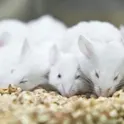
Featured news
14 Feb 2019
Japanese scientists have shown that a new class of sleeping pill preserves the ability to wake in response to threats like earthquakes or intruders – unlike Ambien, Halcion and other market leaders; Frontiers in Behavioral Neuroscience

Neuroscience
23 May 2017
New research, published in Frontiers in Human Neuroscience makes the case against fixed starting times, i.e. a fixed one-size-fits-all daily routine.

Neuroscience
09 May 2017
New research in Frontiers in Neuroscience suggests that cycling while studying may improve sleep quality.
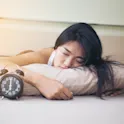
Frontiers news
29 Mar 2017
Led by the new Specialty Chief Editor Prof. Yves Dauvilliers, this multidisciplinary section is open for submissions of studies on sleep, circadian rhythms and their disorders, including the clinical practice. We are happy to announce that Professor Yves Dauvilliers has joined Frontiers in Neurology and Frontiers in Psychiatry as the Specialty Chief Editor of the section “Sleep and Chronobiology”. “Sleep is a universal physiological need that plays a key role in the prevention of health problems. In modern life, sleep disruption through behavioral deprivation is a major issue”, says Prof. Dauvilliers in his Specialty Grand Challenge article. “Sleep disorders are very common and often disabling conditions that can be isolated or associated with neurological disorders. “ Prof. Dauvilliers is Head of the Sleep Laboratory at the University of Montpellier and the Director of the Sleep Disorders Centre, in the Department of Neurology at the Gui de Chauliac Hospital in Montpellier, in France. He is also the coordinator of the French National Reference Network for Orphan Diseases (Narcolepsy, Hypersomnia, Kleine-Levin Syndrome). You may find Professor Dauvilliers’ full biography here. Working on the diagnosis, epidemiology, pathophysiology and therapy of several sleep disorders, Prof. Dauvilliers has focused mainly on neurological disorders including narcolepsy but also […]
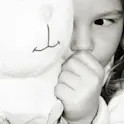
Neuroscience
29 Nov 2016
Sleep deprivation affects children’s brains differently than adults’, according to a new study By K.E.D. Coan, Science Writer Any parent can tell you about the consequences of their child not getting enough sleep. But there is far less known about the details of how sleep deprivation affects children’s brains and what this means for early brain development. “The process of sleep may be involved in brain ‘wiring’ in childhood and thus affect brain maturation,” explains Salome Kurth, first author of the study published in Frontiers in Human Neuroscience, and a researcher at the University Hospital of Zurich. “This research shows an increase in sleep need in posterior brain regions in children.” This contrasts with what researchers know about the effects of sleep deprivation in adults, where the effect is typically concentrated in the frontal regions of the brain. After staying up too late, both children and adults need a period of deep sleep to recover. This recovery phase is characterized by an increase in an electrical pattern called slow-wave activity, which can be measured with a non-invasive technique called an electroencephalogram. With a large number of electrode channels distributed across the scalp, this method also detects which brain regions show […]
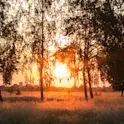
Life sciences
01 Aug 2016
by Juan Jovel, Frontiersin.org It may sound like something from a fantasy book, but scientists have found that trees seem to go to sleep at night. One hour after sunset, tree branches start dangling and continue doing so throughout the night, reaching their lowest point about 9-11 hours after sunset, new research published in the journal Frontiers in Plant Science has found. When morning comes they start to return to their normal position, which takes another three hours. The daily position of the branches and leaves allows trees to maximize their capture of sunlight, which fuels their biomass-producing processes, while the drooping position probably reduces the loss of heat during the night. Circadian rhythms refer to biological processes that cycle roughly every 24 hours and explain, for instance, patterns of sleeping and feeding in animals. The scientists from Finland, Austria and Hungary, setup to investigate whether silver birch trees experience movement patterns in a circadian fashion. They used a sophisticated technique called Terrestrial Laser Scanning (TLS), which allows monitoring the movement of objects, including trees or parts thereof, during day or nighttime. Dr. Eetu Puttonen, from the National Land Survey of Finland, and his international collaborators, used TLS to monitor the […]
Get the latest research updates, subscribe to our newsletter